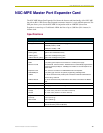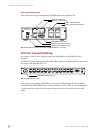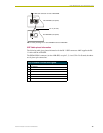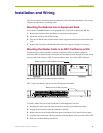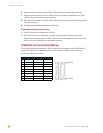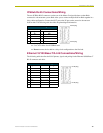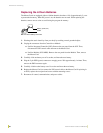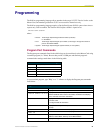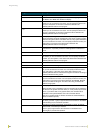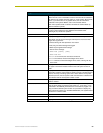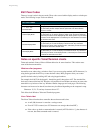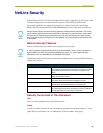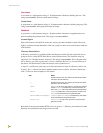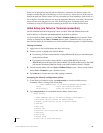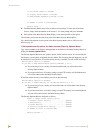
Programming
21
NetLinx Master Cards and Modules
Programming
The NetLinx programming language allows numbers in the range 0-32,767. Device 0 refers to the
Master Card, and numbers greater than 32,767 are reserved for internal use only.
The NetLinx programming language requires a Device:Port:System (D:P:S) syntax where Axcess
expects only a device number. The NetLinx D:P:S triplet variable is expressed as:
DEVICE:PORT:SYSTEM
where:
Program Port Commands
The Program port commands listed in the table below can be sent directly to the Master Card using
a terminal program (i.e. Telnet). Be sure that your PC's COM port and terminal program's
communication settings match those in the following table:
In your terminal program, type "Help" or a "?" <Enter> to display the Program port commands
listed below.
• Device: 16-bit integer representing the device number (0-32,767).
0 = the Master.
• Port: 16-bit integer representing the port number (in the range 1 through the number of
ports on the NetLinx Master.
• System: 16-bit integer representing the system number (0 = this system).
PC COM Port Communication Settings
Baud 38400 (default)
Parity none
Data Bits 8
Stop Bits 1
Flow Control none
Program Port Commands
Command Description
DATE
Displays the current date and day of the week.
DEVICE STATUS <D:P:S>
Displays a list of all active (on) channels for the specified D:P:S. Enter
DEVICE STATUS without the D:P:S variable, the Master Card displays
ports, channels, and version information.
DNS LIST <D:P:S>
Displays:
• Domain suffix
• Configured DNS IP Information
DOC FREE
Displays the total bytes of free space available on the Master Card's Disk
on Chip.
ECHO OFF
Disables terminal character's echo (display) function.
ECHO ON
Enables terminal character's echo (display) function.
GET IP <D:P:S>
Displays the Master Card's D:P:S, Host Name, Type (DHCP or Static), IP
Address, Subnet Mask, Gateway IP, and MAC Address.
MEM
Displays the largest free block of Master Card memory.



